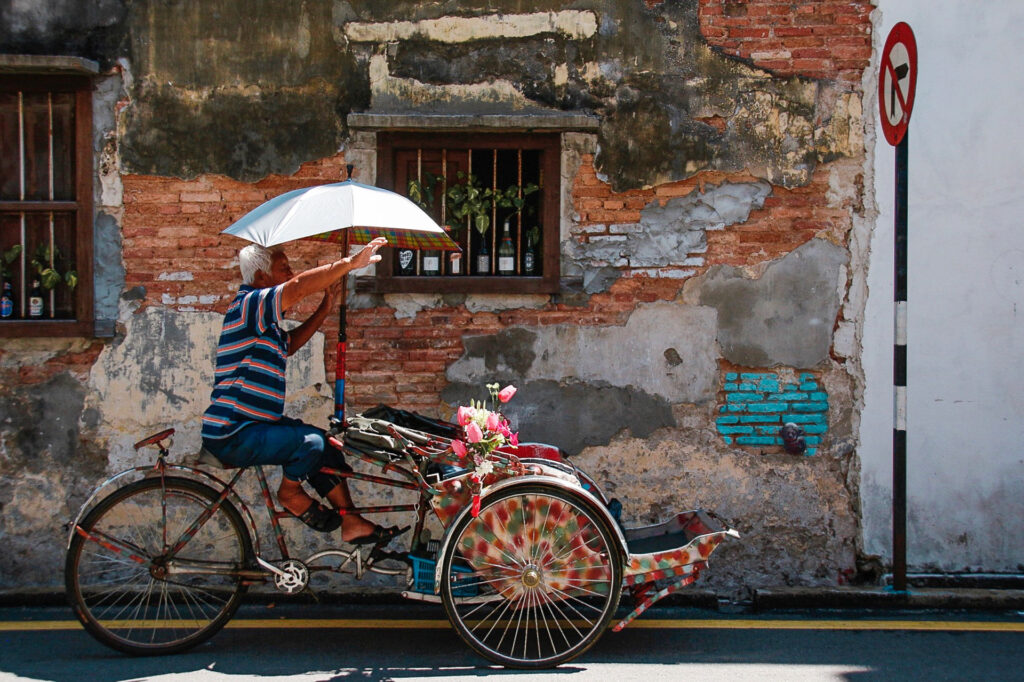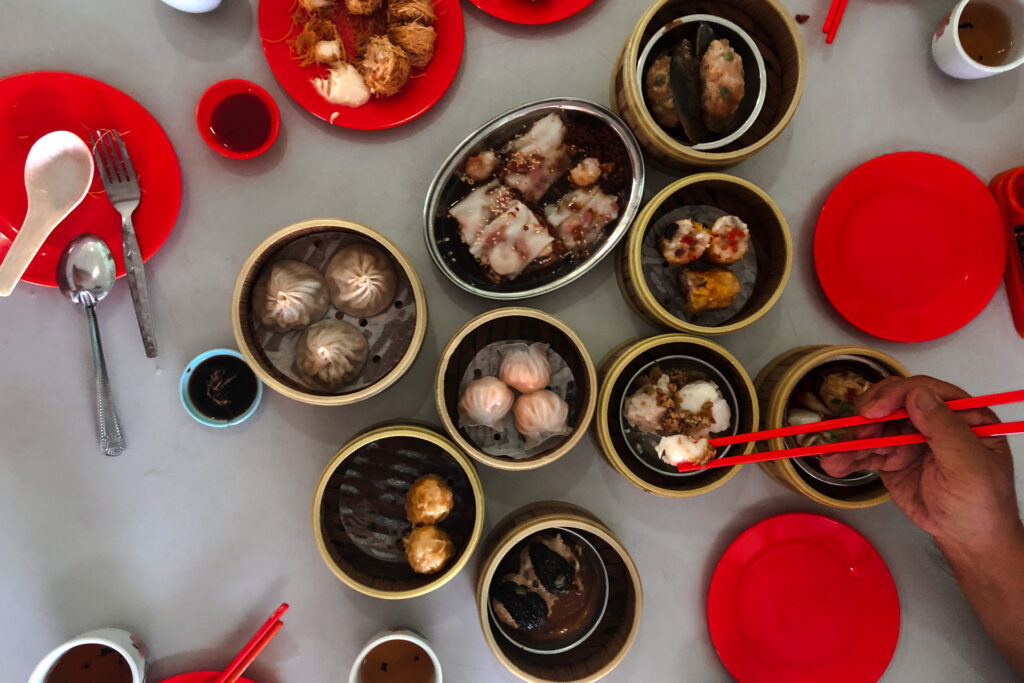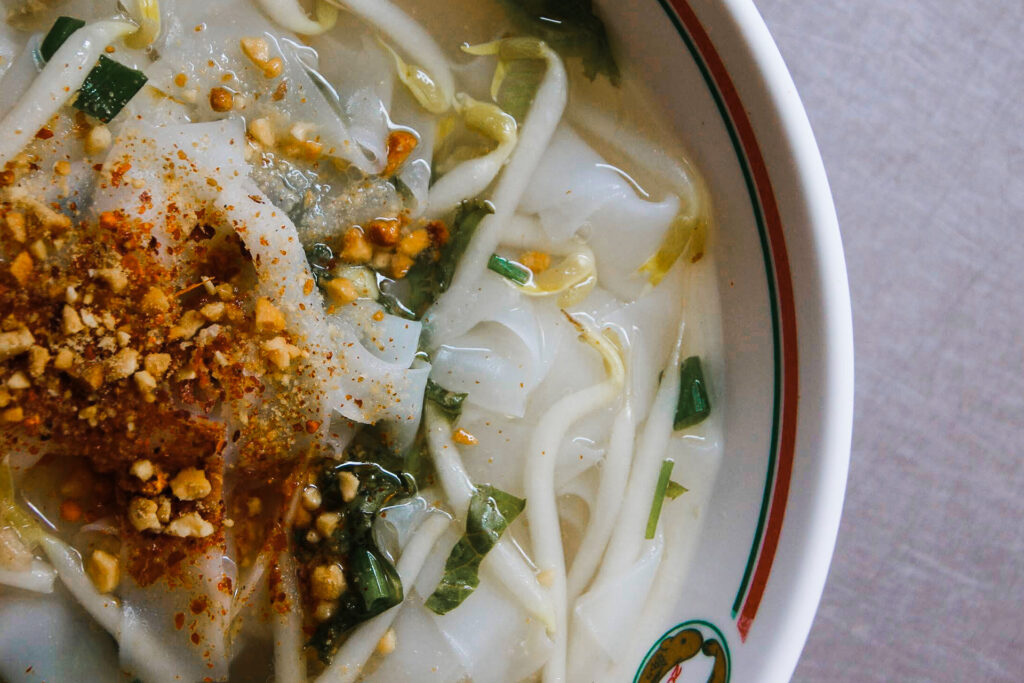I awaken at seven.
The grandchildren have long ago left for school, but I can hear Mr. Tham downstairs, awake in the otherwise quiet house. He stirs tea, slurps porridge, tiptoes around the house with the hush of a mouse so as not to wake up Ms. Annie, sleeping in their bedroom only a wall away.
As I head down the stairs, Mr. Tham has already anticipated my arrival. He is in the kitchen, mixing me a cup of White Coffee, setting a small plate of biscuits down on the table. He motions towards one of the pastries, a long, spongy piece of bread oozing with butter.
“Try that one in the coffee,” he says, sitting down in his regular chair at the end of the table. He sips his tea slowly. “But don’t eat too much, we will go to the market soon.”


In Kampar, there are two markets side by side in the center of town. Our first stop is the Wet Market, where Mr. Tham haggles in Bahasa over fresh, leafy greens. Satisfied with a price, the vendor wraps the greens in a piece of newspaper and plops the bundle in my arms. We drop the package in the backseat of the car before crossing the street to the Food Court, Kampar’s bustling food market and the obvious hub of gossip in town. Women giggle over bowls of beef noodles, their husbands nearby, buried in the Chinese newspaper.
“Try this Ginna.” Mr. Tham stops us in front of a food stall, the man swirling small circles of batter on a hot stovetop. “Apam Balik, crispy pancakes with butter and nuts.”

“Time for a Malaysian breakfast.” Mr. Tham walks off towards another stall, and I follow behind, careful not to trip over the puppy lounging in the aisles.
The woman running the stall serves us a heaping helping of the sweet coconut rice, scoops up a spoonful of sinfully spicy curry, and wraps the entire meal in a piece of banana leaf. We move on.


As if we don’t yet have enough food on our plates, our final stop is the Indian stall, where the vendor quickly whips us up some roti canai in the sun soaked kitchen. A kitten rolls around at her feet, basking in the sunny spots, but the vendor is unbothered, stretching the thin dough with practiced hands. She quickly fries the dough on a large hot pan, throws the finished bread on a tin plate, and tops off the dish with a selection of colorful curries. Red, spiced with chilies and chicken, yellow, smelling of turmeric and lemongrass, and an orange curry I do not recognize.
“Mutton curry”,” Mr Tham says, dipping a finger in the amber-colored sauce. I too dip a pinky in—the curry is savory and slightly spicy, the heat cut with flavors of yoghurt and ginger.


Our feast is complete.
Mr. Tham and I share the meal, our comfortable silence occasionally broken as he greets nearby passerby. He seems to know everyone in this town.
”I have lived here over 50 years,” he tells me, picking up a meatball with his chopsticks. “I taught half the people in this town. That’s why they’re all afraid of me.”
I giggle, but his face is serious. He’s not joking.

After breakfast, Mr. Tham drives us out of town. We stop at a stall selling greasy fried bananas, and the vendor fills us up a large paper bag of the sweet treats before we head on. Back in the car, Mr. Tham notes the bag practically bursting at the seams.
“She was my former student,” he tells me. “See how many bananas there are? She wouldn’t give that many to just anybody.”
We wind away from Kampar, the buildings disappearing behind a wall of palm oil trees and we head further into the jungle. Mr. Tham drives the car with excellent precision, and we finally stop roadside and take a short walk to a nearby waterfall. We sit beside where the water collects, the bag of bananas between us. Besides one other man swimming slightly upstream, we are the only people there.
“All my children grew up here.” Mr. Tham takes a bite of a fried banana. “People always ask me, ‘Why stay in Kampar?’ I tell them, ‘My life is here.’ After long you come to find a place is defined by the people you have there, not the things to do.”
We sit for a while and enjoy the sounds of the stream. Finally it is time to pick up the grandchildren at Tadika Annie, so we wind back down the mountainside and into town. At the kindergarten, Ms. Annie is waiting for us.

“Come in come in!” Ms. Annie has been running Tadika Annie Kampar since the family moved to the town over 50 years ago. The kindergarten is painted with bright shades of green and red, and a tank filled with carrot-colored goldfish bubbles in the corner. As Ms. Annie ushers us into the office, I notice a few dark-eyed children, dressed in bright red Tadika uniforms, staring my way. I wave. They erupt into giggles, waving back.
Inside, the walls are covered with years of Tham family history. On one wall is a series of graduation portraits—the Thams’ son at his graduation from university in Wales, their daughter graduating in the United States, and finally a photo of a young Mr. Tham, clad in graduation robes as he graduates here in Malaysia. A small child is stuck to each arm.
“I already had two children when I graduated,” Mr. Tham tells me. “I married Annie when she was 22, I was 25. We just celebrated 50 years together.”

The opposite wall holds more wedding portraits, a young Mr. Tham and Ms. Annie nestled between photos of their parents weddings days. Ms. Annie is recognizable with her broad smile, Mr. Tham with his serious eyes, both represented on younger faces. Below the wedding portraits hang a series of family photos, gatherings at Chinese New Year, church events, family weddings. In the portraits, Mr. Tham’s hair turns from black to silver, and his children slowly grow taller, eventually disappearing from the photos altogether as they grow up to lead their own separate lives, oftentimes countries away.


One series of photos shows Mr. Tham receiving recognition from the Malaysian Prime Minister.
“I was recognized many times for the work I did with the Boys Brigade,” Mr. Tham tells me, looking at the photos. “I worked as a leader for many years. It is one of my proudest accomplishments.”
Below the photos is a recent portrait of Mr. Tham and Ms. Annie.
“Working for the Boys Brigade was some of my greatest life’s work,” he tells me. He notes the portrait. “But I have done many great things in my lifetime.”

In the back room of the kindergarten, twelve-year-old Jarell is on his stomach, reading a comic book in Mandarin. I sit beside him.
“What does that say?” I ask, pointing to a character at random.
“Thats just a modifier,” he tells me, delving into an explanation of Chinese grammar and structure. He quickly draws the character on another sheet of paper, then adds a single extra line, a hair’s length long.
“And this,” he says, pointing to the new character, “This means something completely different!”
“Chinese sure is hard,” I muse. Nine-year-old Janessa wanders over, seconding my statement.
“No kidding!” she says, strapping on her shoes and picking up her book bag. “Come on Jarell, let’s go home!”
Home is just around the corner. We kick off our shoes at the door, and Ms. Annie says something to Janessa in Cantonese, prompting her to head upstairs. She returns minutes later, hair still damp and her uniform exchanged for a comfortable shirt and loose-fitting shorts. She immediately places the Scrabble board on the table.
“No, no, no!” Ms. Annie shakes her head vigorously for extra effect. “Not before you’ve dried your hair! You’ll catch cold! You’ll get ill!” She muses off more horrors in Cantonese, and Janessa finally gives in. Hair dry, we begin our game.

Janessa may only be nine years old, but her Scrabble skills are unparalleled. Before I realize it, she’s beating me with 100 point words and taking advantage of every triple letter spot on the board. It doesn’t hurt she speaks four languages, and has a word bank of Mandarin, Cantonese, Bahasa, and English to choose from.
The letters are all used up, and just in time. On the other side of the room Ms. Annie turns on the television, and Janessa quickly tallies up our points before running over to watch. She has won, not by any surprise. I join the family at the table as Mr. Tham begins to bring out steaming plates of food for dinner—roasted chicken, steamed fish, and glutenous rice with pork.
We load up our plates and begin to eat as The Story of Yanxi Palace begins on television. The Chinese drama is a favorite of the family, and though I don’t understand the Mandarin or the Bahasa subtitles, I always find myself roped into the action. On screen, a handmaiden throws a porcelain pot at a prince, and the whole family gasps, Ms. Annie shouting in Cantonese at the television. I can only imagine what she’s saying.
When dinner is finished, Janessa looks at me eagerly.
“Want to play some more Scrabble?” she asks, but Mr. Tham cuts her off, reminding her of her nearing bedtime. Making me promise to play more Scrabble with her tomorrow, she and Jarell head upstairs for bed.
My bedtime also nearing, I say goodnight to Ms. Annie and Mr. Tham. Ms. Annie smiles broadly and wraps me in a hug, telling me to rest well and reminding me not to sleep with wet hair. Mr. Tham looks at me, his stern expression earnest.
“Sleep well Ginna,” he says, “We have much more to do tomorrow.”

LOOKING FOR MORE STORIES?



Looking for more? Click here to find all travel stories from Broken Boots Travel.
Love stories? Subscribe to my newsletter to get my latest updates delivered straight to your inbox every month. One email a month + no spam? Sign me up!
Virginia Taylor (Ginna) is a travel writer and photographer exploring the world until her boots wear through. She’s currently on a mission to explore all 32 departments of Colombia, though she formerly called the Middle East home. Want to know more? Visit the About Page.
Enjoyed your write-up!